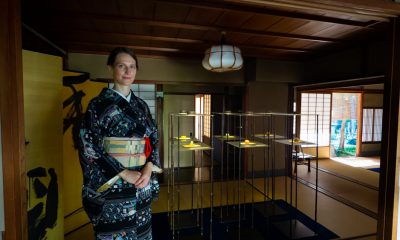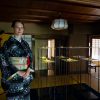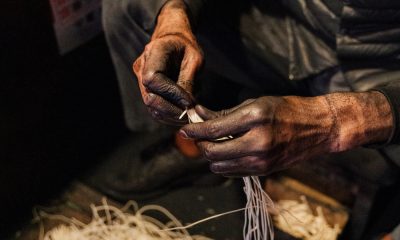Feature
For the Love of Sam
When Carl and Elizabeth O’Brien first came to Japan, they couldn’t have imagined that just a few years later, they would be adopting baby Sam – a Japanese boy with Down syndrome.
Two-year-old Sam O’Brien is small for his age, but a very curious and charming little boy, full of laughter and smiles. He says some words, communicates with a few baby signs, is on his feet a lot, and is irresistibly cute. When Carl and Elizabeth O’Brien say, “We saw him and just fell in love,” it is easy to see why.
“It’s fantastic. He makes everything exciting and he’s happy about everything,” said his mother, Elizabeth.
Sam was born with Down syndrome, a congenital condition that causes slower mental and physical development.
“We had him evaluated to get his disability certification,” explained his father, Carl. “He’s about a year old developmentally. What a typical year-old baby can do, he’s doing right now.”
Other than that, he is just like other little boys. “He loves life, he loves music and trains. And bananas,” Elizabeth smiled. “We’ll give him every possibility to do the things that other kids can do, just give him a little extra boost to get there.”
Carl and Elizabeth have found some special-education kindergartens in their area which they are comparing as they prepare to get Sam started with his education. He has frequent health checkups and receives regular therapy services—physical therapy, speech therapy, and occupational therapy once a week.
“I’ve been surprised at how much support there is in the medical community,” Carl said. “Our physical therapy, occupational therapy, and speech therapy are all just down the street at the hospital, and they’re great.
“The government provides a lot of support. There’s a governmental recognition of Down’s kids so there’s a lot of support there. But culturally, it’s still very taboo. They’re still compartmentalized that way,” he explained.
Carl and Elizabeth came to Japan from the U.S. in 2010 to work as English teachers initially for just a year or two. Like many foreigners who come to Kansai, however, the couple, who live in Ikoma, found themselves enjoying life here and wanting to stay longer.
“Now with Sam, we don’t really have any plans to move back. We want him to grow up in his culture and show that Down’s kids are just as capable as other kids,” Carl said.
“As long as our work visa gets renewed, we’ll stay,” said Elizabeth. “We want him to be an advocate for himself and eventually be able to speak for himself.”
Not only have Carl and Elizabeth decided to make Japan their home, for the time being, but they have also become passionate advocates for disadvantaged children in Japan.
“There is also a stigma against adopted kids, especially orphans, here in Japan,” explained Carl. “That’s going to be our soapbox while we’re here in Japan I think.”
Carl and Elizabeth entered the world of adoption when they decided they were ready to have a family but found they were not able to have their own children biologically. They looked into several options for adopting in Japan and were eventually introduced to Ai no Kesshin. Meaning “Loving Decisions,” this non-profit organization, run by an American couple from their home in Shizuoka, takes in children with disabilities and helps to find them “forever families.”
“At first I think we kind of were like, OK this is a big deal, are we sure we want to do this?” Elizabeth recalled. “It really challenged our own motivations for wanting to adopt because at first, we were like, ‘We want a baby!’ Then we were like, ‘OK this is a baby that is going to need extra from us. Are we really up to this?’ But after realizing he’s a person and needs a family, how could we say no?” she said.
“I think a lot of the apprehension came from just not knowing what to expect,” explained Carl.
“When we heard about him at first, and that he had Down syndrome, we started obviously doing the research. One of the specific things that we learned about Down syndrome is that it is more of an obstacle than a barrier. There isn’t a ceiling on his potential, just like there isn’t a ceiling on ours, it’s just going to take him longer to get there.
“It takes twice as much energy for him to activate his muscles than it takes for us. So he gets tired faster. Yesterday we took him to the park for 20 minutes, and he still hasn’t recovered yet. He’s exhausted!”
For many couples, the cost of adoption and the amount of red tape can put them off of following through with it. But for Carl and Elizabeth, the process was relatively easy.
“Ai no Kesshin is a non-profit organization, so they just asked to be reimbursed for all the fees that they incurred for the child. So it’s a lot cheaper, actually, to adopt through them than it would be if we were in the U.S. trying to adopt internationally. Or trying to adopt internationally from Japan,” said Elizabeth.
“Because we don’t have to pay lawyer’s fees or anything like that, for Sam it cost a little over $3,000 USD.”
The couple went to visit Sam once before he was placed with them as a seven-month-old and then started the ball rolling with the court system.
“The system is not necessarily set up for foreigners, but it works,” said Elizabeth. “It was complicated but doable. It was long, but not as long as other people are waiting. From the time he was placed with us until the adoption was finalized was six months, which is really reasonable. We had great case workers and everyone was really helpful.
“Now we just have to change his passport, get him another Japanese passport with his new name on that, and eventually immigrate him so that he’s also a U.S. citizen,” she said.
In fact, Carl and Elizabeth had so much success with the system that they are in the process of adopting another child with Down syndrome from the same organization—a little girl just three months younger than Sam.
Unexpected as it may have been, it seems that through their stint in Japan the O’Briens have found their calling. They are offering encouragement and support to any families willing to adopt children in need in Japan.
“Kids are waiting. Our agency has 11 more waiting children right now. These kids need families and we really want to encourage people to rise to the challenge. Because it’s doable, and they’re valuable members of society and they deserve a voice,” said Elizabeth.
“They don’t get that family experience at all growing up in an orphanage. So they miss out on that whole life we take for granted.”
More Information
Ai No Kesshin
2-13-7 Karase, Aoi-ku, Shizuokashi,
Shizuoka-ken 420-0937
Tel: (+81) 05-4247-9411
US Embassy Information on
Adoption in Japan: japan.usembassy.gov/e/acs/tacsadopt.html
すべてはサムのため
日本へやってきたばかりの頃、カールとエリザベスは数年後に待ち受けている運命など知る由もなかっただろう。二人がこの地で授かった子供の名はサム。ダウン症で生まれた日本人の男の子である。
2歳になるサム・オブライエンは、同じ月齢 の子供よりも小柄な男の子だ。好奇心旺盛 で、愛らしい笑顔は絶えることがない。言葉 もいくつか話すし、子供らしい身振りで気持ちを伝え、立ち上がって歩く様子がたまらないほどに可愛らしい。カールとエリザベス が、一目会ったその日から恋に落ちたのも無理はない。サムの母親、エリザベス・オブ ライエンが語る。
「本当に夢のようです。サムは周囲のあらゆるものを輝かせ、何でも喜びに変えてしまいます」
サムはダウン症で生まれた。心身の成長が一般より緩慢になる先天性疾患である。父親のカール・オブライエンが説明する。
「診断を受けて、身体障害が認定されました。発達度でいえば、サムはちょうど1歳くらい。ごく普通の1歳児がやることを、サム は今やっています」
それを除けば、サムは他の子供たちと何ら変わらない。エリザベスが笑顔で教えてくれる。
「サムは生き物、音楽、電車、バナナが大 好き。みんなと同じことが少しでもできるよう、他の子供たちがすることは何でもさせ てあげようと心がけています」
そろそろサムの教育について考える時期になり、カールとエリザベスは近所にあ る特別支援保育園を比較検討中だ。サム は頻繁に健康診断を受けている。週に一度 の理学療法、言語療法、作業療法などの定 期的な治療サービスも利用しているとカー ルが言う。
「これほどまでの医療支援が得られるこ とに驚きました。理学療法、作業療法、言語療法はみな近所の病院で受けられ、その内容も素晴らしいものです。ダウン症の子供たちに関する政府の理解は深く、手厚いサポ ートがあるのです。でも文化面から見れば、
ダウン症へのタブー視は根強く残っていま す。普通の子供たちと区別され、遠ざけられ ていると感じます」
カールとエリザベスは、2010年に日本 にやってきた。当初は英語教師として1〜2 年ほど滞在するつもりだったが、予定よりも 長く留まることにした。生駒に居を構えた二 人は、多くの訪日外国人たちと同様に、関西での生活が気に入ったのだ。カールは語る。
「今はサムがいるから、アメリカに帰る計画はありません。サムが自分の生まれた土地の文化環境で育ち、ダウン症の子供たちにも他の子供と同じ能力があることを証 明してもらいたいと願っています」
日本でサムを育てようという意思は、妻 のエリザベスも同じだ。
「就労ビザが更新されている限りは、日本にいるつもりです。サムが自分の存在に自信を持ち、最終的には自分の意見を主張 できるようになってほしいですね」
日本にしばらく根を下ろすことに決めた カールとエリザベスは、障害を持つ日本の子供たちの熱心な支援者として活動するよ うになった。カールが説明する。
「ここ日本では養子縁組に対する偏見も あり、孤児であればなおさらです。日本に住む限り、私たちはこの問題についても訴え続けるでしょう」
家族を作ろうと決めたカールとエリザベ スは、生物学的な実子を持てないことがわ かって養子縁組の世界に足を踏み入れた。 日本で養子を迎えるための選択肢をいくつ か検討した二人は、あるアメリカ人夫婦が運営する「愛の決心」を紹介される。障害を 持つ子供たちを受け入れ、「永遠の家族」 との橋渡しをしている静岡県の非営利団体 だ。当時の思いをエリザベスが回想する。
「大変な決断でした。本当に自分たちが望んでいることなのかと、最初は二人で思い悩みました。養子を迎えたいという私たち の意思が、どこまで本気なのか試されてい る気がしました。『赤ちゃんが欲しい!』という 程度の軽い考えが、『この子には他人より大きな助けが必要になる。自分たちは本当にその準備ができているのか』という問いに変わりました。そしてこの子も一人の人間で あり、家族が必要なのだと気づいたとき、ノ ーと言うことなどできないと思ったのです」 カールもまた、葛藤からさまざまなことを学んだ。
「不安の多くは、何が待ち受けているか わからないという無知から来るものでした。 サムがダウン症の子だと知らされた私たちは、ご多分に漏れずいろいろ調べました。は っきりとわかったのは、ダウン症が絶対的な障壁ではなく、克服できる障害物のようなものであるということ。サムの可能性は私たちと同様に無限で、何かを成し遂げるのに人より時間がかかるだけなのです。筋肉を使うことで、サムは私たちの倍のエネル ギーを消耗します。昨日も20分かけて公園に連れていきましたが、まだ疲れが残っているようです。サムは本当に疲労困憊するんですよ」
養子を迎えたいと考えた夫婦の多くが、 高額な費用と面倒な手続きに直面して養子 縁組を諦めていく現実がある。だがカール とエリザベスの場合、そのプロセスは比較的かんたんなものだった。エリザベスがいきさつを明かしてくれる。
「非営利団体である『愛の決心』は、それまで子供にかかった費用だけしか受け取 りませんでした。だからアメリカや日本で国 際的な養子縁組をするよりだいぶ安く済ん だのです。弁護士費用なども一切必要ありません。サムとの養子縁組にかかった費用 は、3,000ドル強です」
二人は生後7カ月のサムを一度だけ訪ね、自宅に迎えてから法務手続きが始まっ た。エリザベスが当時を振り返る。
「養子縁組制度は外国人向けのもので はありませんが、ちゃんと機能しています。 手続きは複雑でも滞ることがなく、時間も他の人たちほど長くはかかりませんでした。同 居を始めて養子縁組が確定されるまで、6カ月という期間は妥当なものだと思います。 親切な民生委員のみなさんにも、本当によくしていただきました。あとはサムのパスポー トを書き換えるだけです。名前が記載された日本の旅券を改めて取得し、最終的には移住を申請してアメリカ国籍も取得します」
養子縁組制度によって家族が持てたカールとエリザベスは、もう一人の養子を迎える手続きを進めている。サムよりも3カ月だけ 年下の、ダウン症の女の子だ。
想像もできないような日本滞在中の展開 で、オブライエン夫妻は天命に気づいたのかもしれない。援助が必要な日本の子供たちはまだまだいる。養子に迎えてもよいと考えるすべての人々や家族に対して、二人は 励ましと支援を差し出す。現在の活動について、エリザベスは思いを語った。
「子供たちは里親が現れるのを待っています。現在も11人の子供たちが代理人のもとに登録されており、みな家族を必要としています。困難に立ち向かう人たちを、私たちは励まし続けます。養子縁組は難しくありません。この子供たちも社会の大切な成員 で、発言する権利があります。孤児院で育つことになれば、本当の家族生活は経験できないでしょう。私たちが当然だと思っている普通の生活が、子供たちの人生から失われてしまうのです」
「はっきりとわかったの は、ダウン症が絶対的な障壁ではなく、克服できる障害物のような ものであるということ。 サムの可能性は私たち と同様に無限で、何かを成し遂げるのに人よ り時間がかかるだけな のです」

















